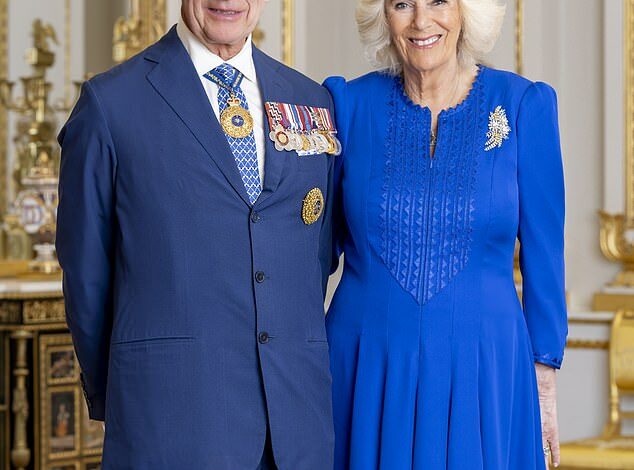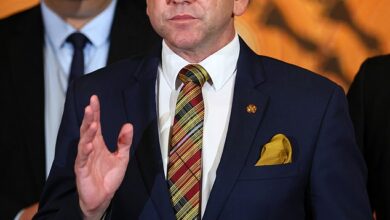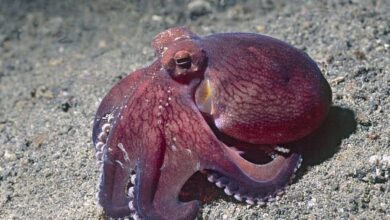Charles says he won’t stop Australia from abolishing British monarchy: King tells republican campaigners he has ‘deep love’ for the country but won’t block moves for country to become a republic ahead of a historical tour

The king will not stand in the way of Australia seeking to replace him as head of state, he has told republican campaigners.
As Charles prepares for a historic visit Down Under, he told anti-monarchists he would not interfere if the people of Australia one day voted to depose him.
In a letter to the Australian Republic Movement (ARM), which had written to Buckingham Palace to request a meeting with the monarch when he arrives next week for his historic royal tour, his assistant private secretary emphasized the “deep love and affection’ of His Majesty for Australia. .
Dr. Nathan Ross added: “Rest assured that your views on this matter have been very carefully noted.
“His Majesty acts as a Constitutional Monarch on the advice of his Ministers and whether Australia becomes a republic is therefore a matter for the Australian public to decide.”

The official Australian portrait of His Majesty King Charles III and Queen Camilla

Graham Smith, from campaign group Republic, ready to protest against the monarchy in Australia

Republic CEO Graham Smith speaks at a rally against the monarchy during the first anniversary weekend of King Charles III’s coronation
He also praised them for their “care” in writing, saying it was “greatly appreciated.”
The ARM itself had praised the royal family’s “important contribution”, saying many Australians would “continue to respect the British monarchy” and wish the two countries remained “the closest of friends and allies”.
But they stressed in their letter that it was time for their country to be “on an equal footing with other countries internationally” and claimed there was growing support for the move.
The last referendum on this issue took place in 1999, when almost 55 percent voted no to the dismissal of the head of state.
However, in January the Australian government said it had indefinitely suspended new plans for a vote, with ministers saying it was ‘not a priority’.
The king’s sentiments are not a change in policy, but the fact that he is doing so on the eve of such a major tour shows the new maturity of the debate surrounding the issue. The strength and durability of the royal family’s ties with Australia are such that there is no doubt that such a move would end in disappointment.

King Charles III and Queen Camilla disembarked from the Royal Navy frigate HMS Iron Duke in Bordeaux on September 22 last year

Charles III and Queen Camilla pass a group of anti-royalists carrying ‘Not my King’ placards during the State Opening of Parliament

King Charles III and Queen Camilla visit Uhuru Gardens in Nairobi, Kenya on October 31 last year

Graham Smith speaks at an anti-monarchy protest ahead of the Commonwealth Service on March 13 last year
But as the king makes clear through his private secretary, this is something he would accept.
Currently, fourteen countries around the world retain the British monarch as head of state.
The latest country to cut ties was Barbados, which became a republic in 2021 but remains a key Commonwealth ally and has warm relations with Britain.
As Prince of Wales, Charles represented the late Queen at their independence celebrations and had an official phone call with the country’s Prime Minister this week.
Jamaica has made it clear that it also wants independence and will vote on the issue later this year, with other countries following suit. But countries like Australia, New Zealand and Canada are much less likely to cut the cord.
The King’s representative in Australia, Governor-General Sam Mostyn, recently said the King has “a huge appreciation” for Australia and wants to celebrate the best of the country where he can.
“He wants to see modern Australia and work with communities more broadly, but within a tight timeframe given his health,” she said.
Ms Mostyn described the king as a “very kind man” who was “deeply invested in Australia’s success in its own right”.
ARM co-chairman Nathan Hansford told the Mail that their invitation to discuss the matter with the king was “politely declined”, adding: “The concept of Australia having a monarch does not sit well with most Australians in 2024.” We are such a wonderfully diverse nation that most people don’t think is represented by a monarch.’

Graham Smith, CEO of Republic, is pictured protesting against the monarchy opposite Westminster Abbey on March 11

King Charles III and Queen Camilla pose in front of the RNLI lifeboats during an official visit to Guernsey on July 16

Pictured: Smith in Australia, ready to protest against the monarchy
When the king arrives on Friday, accompanied by Queen Camilla, for a six-day official visit, it will not only be his first as sovereign but also the first time a British king has ever visited the country.
The only reigning monarch in recent history to visit was the late Queen Elizabeth, who remains popular there.
Her death in 2022 led some to suggest there might be a groundswell of support for the anti-monarchist cause.
However, according to a poll by The Australian, national appetite for a republic has grown by just 4 percent in a decade, which the newspaper described as “hardly a tsunami of support.”
The country’s current Prime Minister, Anthony Albanese, although he has a personally ‘warm’ relationship with King Charles, has made no secret of his desire to vote again.
He has previously said a republic is “inevitable” and appointed the country’s first-ever minister dedicated to this mission.
But earlier this year, Mr Albanese, who will meet the king during his visit, shelved the issue and the ministerial role was axed.
Charles and Camilla’s reception is expected to be disrupted by anti-monarchist campaigners – but not Australian ones.
British group Republic has dispatched its CEO, Graham Smith, to organize ‘Not My King’ protests at royal engagements in Sydney and Canberra.
Ironically, this is in direct conflict with the wishes of Australian republican campaigners.
ARM’s Hansford told the Mail: “We are not protesting, we are focused on encouraging conversation within Australia about our independence.”

The King is greeted by schoolchildren during a visit to Kilkenny Primary School on November 7, 2012 in Adelaide

King Charles III and Queen Camilla during a visit to Kenya last year
Mr Smith has already posted a series of selfies on social media in recent weeks, including waving a flag alone on a beach, during his own tour of the country.
As an Australian citizen living in Britain, he insisted he was not campaigning for an Australian republic there. He says he wants to ‘challenge the King’s role in representing Britain abroad’ and raise awareness that Britain is not a ‘royalist nation’.
When asked how he paid for his trip, Mr Smith said it was funded by members and donors, but he “kept costs minimal” by staying with friends.
News that a British group with no ties to Australia is trying to disrupt the royal visit has not gone down well with some – and is believed to significantly increase the cost of overseeing the tour.
Philip Benwell, National President of the Australian Monarchist League (AML), said: ‘This is clear foreign interference in the way Australians interact with their sovereign head of state, particularly through UK funding for posters and material designed to spread division in our country. create. No foreign organization should ever interfere with our democracy.”
Describing Mr Smith’s behavior as arrogant, he continued: ‘We only hope that the proposed protests from the republicans, especially those from the head of government, [British] Republic, will not detract from the visit or deter people from attending. He may have ties to Australia, but we don’t want him here.”
He also praised the king’s “courage” in undertaking the “arduous” journey despite his cancer diagnosis.
Mr Benwell said there was enormous ‘goodwill’ for the visit and affection for the royal family in general.
New South Wales Police said: “A police operation will take place during the visit. The priority is to ensure the safety of the visiting dignitaries and the community.”




